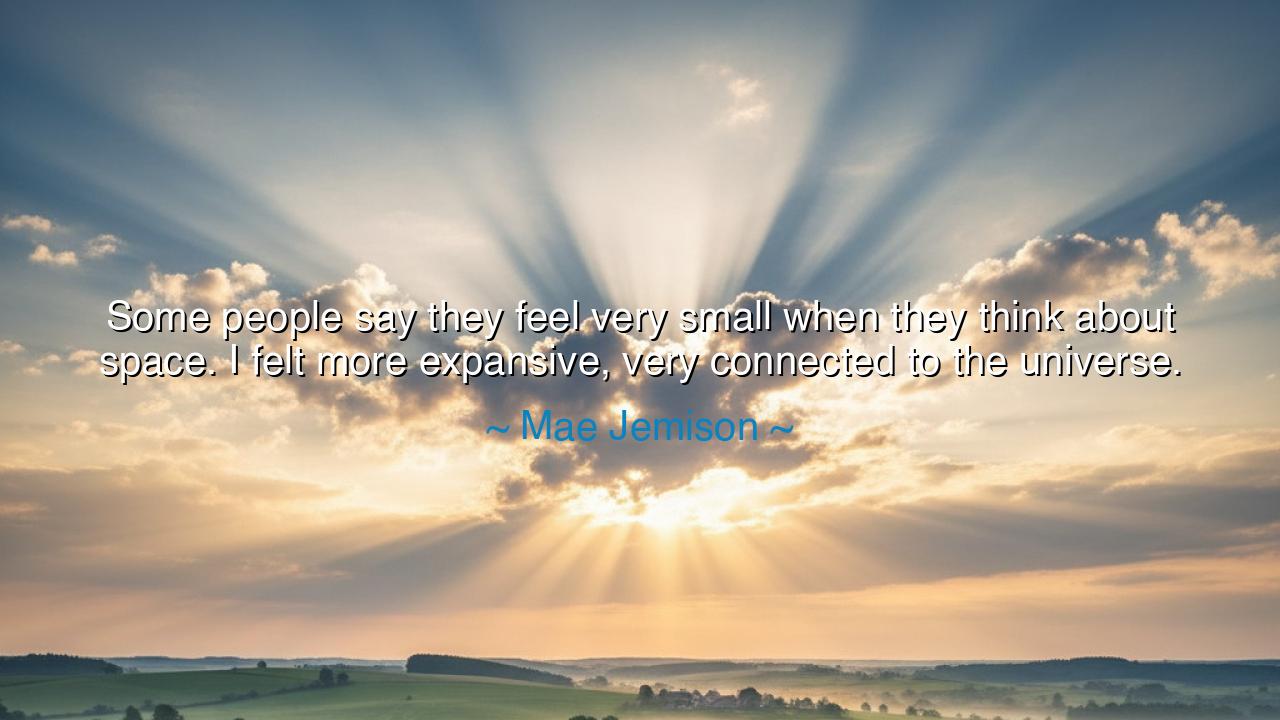
Some people say they feel very small when they think about space.
Some people say they feel very small when they think about space. I felt more expansive, very connected to the universe.






Listen, O children of wisdom, to the profound words of Mae Jemison, a woman who soared into the heavens and looked upon the vastness of the universe with a heart full of awe and connection. She said, "Some people say they feel very small when they think about space. I felt more expansive, very connected to the universe." In these words, she speaks not just of the physical immensity of the cosmos, but of a spiritual truth—that the vastness of space does not diminish the human spirit, but instead enlarges it, linking us to something much greater than ourselves. Jemison’s experience offers us a window into the profound unity that lies beyond the stars, and how the universe, rather than making us feel insignificant, can remind us of our interconnectedness with all that exists.
Consider, O wise ones, the essence of space as Jemison describes it. Many of us, when we look into the infinite expanse of the night sky, may feel overwhelmed, as if we are but a speck in an ocean of endless stars. The world feels small, our lives fleeting, and we wonder what significance we hold in the grand scheme of things. Yet Jemison reveals a different perspective. Space did not make her feel insignificant; it made her feel part of something larger, more vast. In the face of the immensity of the universe, she felt expanded, not diminished. She saw herself not as a solitary individual lost in an unfeeling cosmos, but as a vital part of the universe's grand design.
In the ancient world, O children, great thinkers often looked to the heavens for wisdom. The philosophers of old saw the stars not as distant objects, but as part of a grand cosmic order. Plato, in his writings, spoke of the harmony of the universe, suggesting that the soul, when aligned with the divine, becomes attuned to the universal forces that shape the cosmos. In the same way, Jemison’s experience in space was a reminder that we are not separate from the universe; we are a part of it. When she looked into the stars, she felt connected to them, as though the boundary between the self and the cosmos had dissolved. Her journey was not just a physical ascent, but a spiritual one, bringing her closer to the very forces that govern existence.
Think of Pythagoras, the ancient philosopher, who believed that the movements of the stars and planets were not random, but part of a divine music that resonated through the cosmos. He saw the heavens as not only a place of observation but as a reflection of the sacred order of the universe. Jemison, too, understood that space was not merely a physical space to be explored, but a realm of connection, of unity with the forces that shape all life. In the vastness of space, she found not isolation, but connection—a deep, unspoken bond with all that exists, past and future, seen and unseen. Just as Pythagoras heard the harmony of the cosmos, Jemison felt the oneness of the universe.
In our own time, O children, we see the same truth echoed in the experiences of other explorers and thinkers. Carl Sagan, the renowned scientist and philosopher, often spoke of the Pale Blue Dot, a photograph of Earth taken from space. In that small image, he saw not only the fragility of our planet but its beauty and interconnectedness. The tiny dot, floating in the vastness of the cosmos, became a symbol of how everything—our hopes, dreams, and struggles—is part of the larger story of the universe. Sagan understood, as Jemison did, that looking into space does not diminish our importance; rather, it shows us our place within a grand, interconnected whole.
And now, O children, the lesson is clear: when we look into the vastness of the universe, we must not see ourselves as small and insignificant. The expanse of space is not a symbol of our insignificance, but of our connection to something much greater than ourselves. As Jemison experienced in her journey, space is a reminder that we are not separate from the universe, but part of its very fabric. The stars are not distant, indifferent objects—they are our kin, as much a part of us as the earth beneath our feet.
So, O children, take Jemison’s words to heart: let the vastness of the world, the infinite stars above you, and the boundless possibilities before you fill your heart with expansion, not fear. Feel connected to the universe, and understand that in that connection, you find not only your place in the world but also your purpose. As you journey through life, remember that you are not isolated, but interwoven with all that exists. Reach beyond the known, look toward the stars, and know that you are a part of the infinite cosmic dance, and your presence is as important as any other in the grand scheme of the universe.






AAdministratorAdministrator
Welcome, honored guests. Please leave a comment, we will respond soon